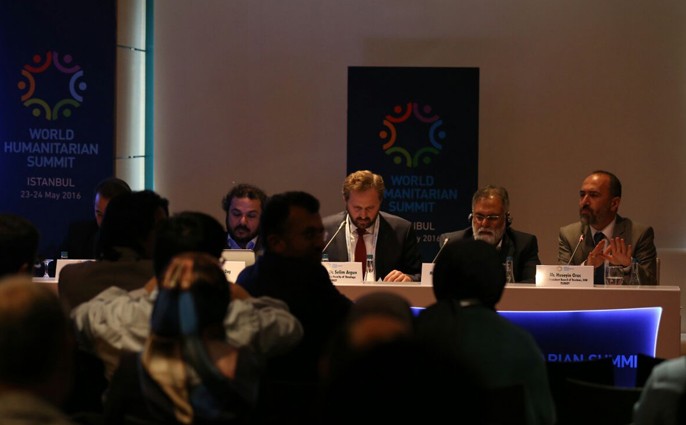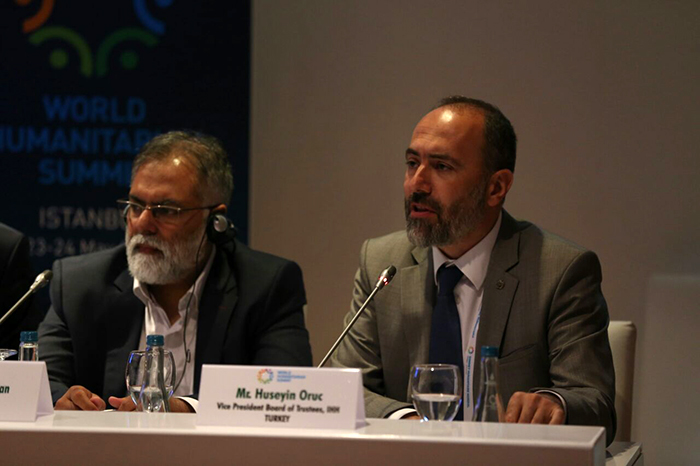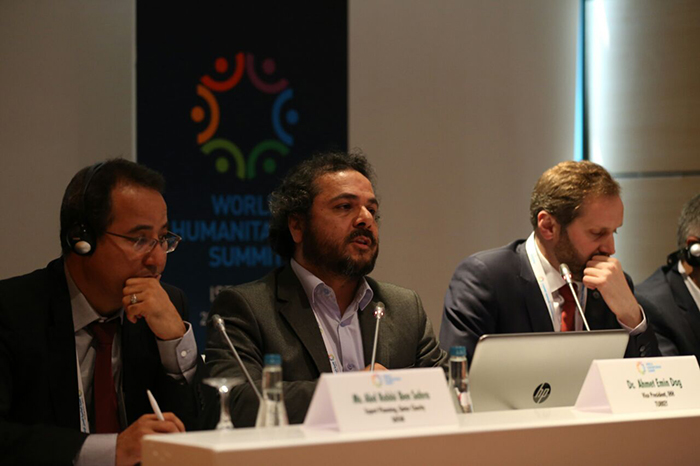
First of its kind, World Humanitarian Summit held in Turkey continues on its second day in Istanbul Congress Centre.
IHH deputy head of board, Hüseyin Oruç was one of the speakers of the panel discussion entitled “Humanitarian Relief Aid in Conflict Areas and Its Challenges” in WHS which IHH is participating. In the panel held in Lütfi Kırdar Congress and Exhibition Palace Oruç mentioned that crisis areas cover many parts of the world today as crises have spread all around the globe.

Oruç explained that the root cause of the current distressful picture is the system set up following WWII. "There are certain peacekeeping principles adopted by UN to tackle with crises which had been working out well for a while. Under the circumstances at the time those principles, which made sense back then, were adopted. The principle of impartiality is no more valid for us. There is an ongoing crisis here” he said.
"IHH is in the field"
Oruç also pointed out they are helping out people regardless of their ethnic, religious and sectarian backgrounds.
"One of the UN peacekeeping principles is impartiality. We see how far it is implemented. It is hard to talk about impartial independent bodies while Palestine is as it is. Regarding the principle of being humane, when we started to work in Bosnia in 1992 we have experienced it as well. No one asked “how would Muslims feel about it?” As soon as we entered stage then the circumstances changed. We are in the field and we say different things now” he said.
Oruç said that he believed political leaders can find a solution while the things NGOs can cover are limited.
Oruç noted that IHH has been in Syria since day one of the crisis and stayed by the side of the people. “IHH is the first organization which sided with the people out there. All of our activities are efforts make sure that people are in the table, part of the discussion” he added.
Oruç highlighted that a country with the veto power keeps shelling people while the system is still calling for impartiality.
"Something that we take utmost care about although it is not very common in Europe is justice. We have to be just. We are at an important threshold. We have means to voice out our opinion. I hope it is heard. There is something that everybody is complaining about. As our president has also mentioned, it is the structure of UN Security Council. I do not believe anyone in the world would say no to aid to Syria or Palestine. All UN resolutions regarding humanitarian aid should be exempt from veto. While you are trying to deliver aid to Syria some other country in the UN is shelling the place. This is the most important thing to say in this summit” he concluded.

"Violence Remains"
IHH Humanitarian Relief Foundation board member and Research Centre coordinator Dr. Ahmet Emin Dağ made a presentation entitled “Conflicts and Tension in the Middle East” and highlighted that the region is chronically full of tension.
After briefly mentioning the several coup d’etats in the region, Dağ pointed out that the mode of the conflicts have changed.
Dağ explained that all conflicts so far were based on power struggle. "This political tension has turned into an existential crisis. While it initially was a power struggle it turned to a struggle of survival as the conflict drags on and power of the warring parties is decreasing. Indeed this is what is happening in Syria, Iraq and Yemen over the past four years. A never ending violence remains.”
Dağ also noted that the war continues because of the involvement of other countries so much so that the conflict has evolved to a war between the countries involved in the conflict.
Dağ said that the war follows no rules now. “Conflict areas have become the battleground of regional and global power. In terms of civilian casualties Syria is number one which suffered the most harm. There are hundreds of thousands of civilian casualties. Yemen and Libya follows Syria in close combat regions list” he added.
Syria is the most critical case among all, Dağ said and gave a brief about the statistics for the humanitarian relief organizations to set their priorities.
"The hopes for co-existence is disappearing”
Dağ reported that last year various bodies and organizations funded 60% of the relief aid to Syria 45% of the relief aid to Iraq 40% of relief aid to Yemen, and 65% of relief aid to Libya while the remaining aid was funded by individual donations.
Summing up the refugees capability to have access to accommodation, food and education Dağ added:
"The skirmishes caused lots of casualties. Almost every family lost one of theirs. The hope for peace and coexistence in the region is dwindling. The last five years produced 2,5 million disabled people, which means it is unfeasible for these people to get up on their feet in the long run. A generation of adults with qualifications is destroyed. It is a situation where an entire nation is robbed off of their future. This creates the environment for groups like DAISH to flourish."
First of its kind, World Humanitarian Summit held in Turkey continues on its second day in Istanbul Congress Centre.
IHH deputy head of board, Hüseyin Oruç was one of the speakers of the panel discussion entitled “Humanitarian Relief Aid in Conflict Areas and Its Challenges” in WHS which IHH is participating. In the panel held in Lütfi Kırdar Congress and Exhibition Palace Oruç mentioned that crisis areas cover many parts of the world today as crises have spread all around the globe.
Oruç explained that the root cause of the current distressful picture is the system set up following WWII. "There are certain peacekeeping principles adopted by UN to tackle with crises which had been working out well for a while. Under the circumstances at the time those principles, which made sense back then, were adopted. The principle of impartiality is no more valid for us. There is an ongoing crisis here” he said.
"IHH is in the field"
Oruç also pointed out they are helping out people regardless of their ethnic, religious and sectarian backgrounds.
"One of the UN peacekeeping principles is impartiality. We see how far it is implemented. It is hard to talk about impartial independent bodies while Palestine is as it is. Regarding the principle of being humane, when we started to work in Bosnia in 1992 we have experienced it as well. No one asked “how would Muslims feel about it?” As soon as we entered stage then the circumstances changed. We are in the field and we say different things now” he said.
Oruç said that he believed political leaders can find a solution while the things NGOs can cover are limited.
Oruç noted that IHH has been in Syria since day one of the crisis and stayed by the side of the people. “IHH is the first organization which sided with the people out there. All of our activities are efforts make sure that people are in the table, part of the discussion” he added.
Oruç highlighted that a country with the veto power keeps shelling people while the system is still calling for impartiality.
"Something that we take utmost care about although it is not very common in Europe is justice. We have to be just. We are at an important threshold. We have means to voice out our opinion. I hope it is heard. There is something that everybody is complaining about. As our president has also mentioned, it is the structure of UN Security Council. I do not believe anyone in the world would say no to aid to Syria or Palestine. All UN resolutions regarding humanitarian aid should be exempt from veto. While you are trying to deliver aid to Syria some other country in the UN is shelling the place. This is the most important thing to say in this summit” he concluded.
"Violence Remains"
IHH Humanitarian Relief Foundation board member and Research Centre coordinator Dr. Ahmet Emin Dağ made a presentation entitled “Conflicts and Tension in the Middle East” and highlighted that the region is chronically full of tension.
After briefly mentioning the several coup d’etats in the region, Dağ pointed out that the mode of the conflicts have changed.
Dağ explained that all conflicts so far were based on power struggle. "This political tension has turned into an existential crisis. While it initially was a power struggle it turned to a struggle of survival as the conflict drags on and power of the warring parties is decreasing. Indeed this is what is happening in Syria, Iraq and Yemen over the past four years. A never ending violence remains.”
Dağ also noted that the war continues because of the involvement of other countries so much so that the conflict has evolved to a war between the countries involved in the conflict.
Dağ said that the war follows no rules now. “Conflict areas have become the battleground of regional and global power. In terms of civilian casualties Syria is number one which suffered the most harm. There are hundreds of thousands of civilian casualties. Yemen and Libya follows Syria in close combat regions list” he added.
Syria is the most critical case among all, Dağ said and gave a brief about the statistics for the humanitarian relief organizations to set their priorities.
"The hopes for co-existence is disappearing”
Dağ reported that last year various bodies and organizations funded 60% of the relief aid to Syria 45% of the relief aid to Iraq 40% of relief aid to Yemen, and 65% of relief aid to Libya while the remaining aid was funded by individual donations.
Summing up the refugees capability to have access to accommodation, food and education Dağ added:
"The skirmishes caused lots of casualties. Almost every family lost one of theirs. The hope for peace and coexistence in the region is dwindling. The last five years produced 2,5 million disabled people, which means it is unfeasible for these people to get up on their feet in the long run. A generation of adults with qualifications is destroyed. It is a situation where an entire nation is robbed off of their future. This creates the environment for groups like DAISH to flourish."